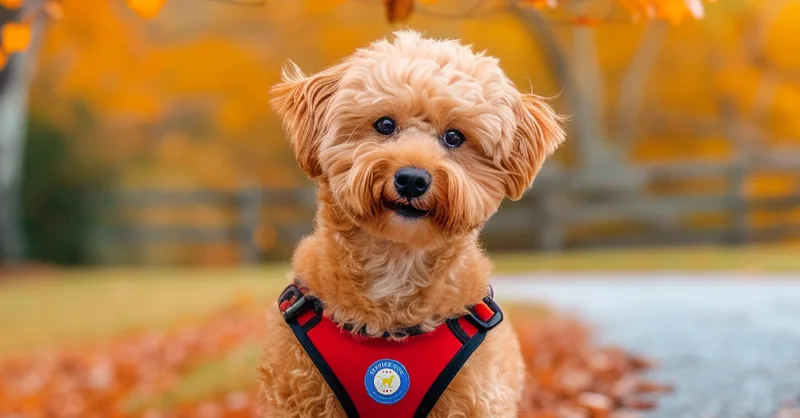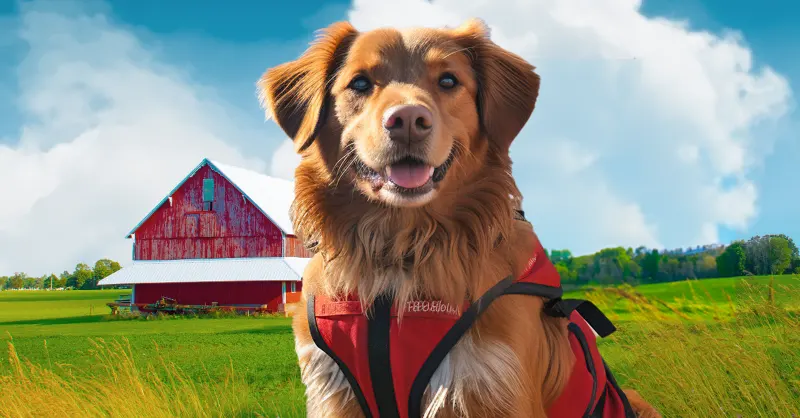Archive for the ‘Service Dog Tips’ Category
Residents of Virginia who need a service dog are legally protected under federal law and state-specific statutes. The Americans with Disabilities Act (ADA) and Virginia Code §51.5-44 safeguard the rights of service dog owners in the Old Dominion.
In Virginia, service dogs must be granted access to public areas, regardless of general prohibitions against pets. This article provides an in-depth look at service dog requirements in Virginia.
Handler Health RequirementsTo qualify for a service dog in Virginia, an individual must have a recognized physical or mental disability. The ADA defines a “disability” as a physical or mental impairment that substantially limits one or more major life activities, such as working, socializing, or attending school.
Physical disabilities can range from visual and hearing impairments to mobility issues. Mental health disabilities include severe conditions like depression, anxiety disorders, PTSD, autism, and learning disabilities. Service dogs catering to mental health needs are often referred to as psychiatric service dogs.
Virginia Service Dog Training RequirementsHaving a disability isn’t enough by itself to qualify for a service dog. The service dog must be trained to perform tasks or provide assistance directly related to the individual’s disability.
Service dogs in Virginia are trained for a multitude of tasks. For physical disabilities, this might include aiding in mobility, guiding visually impaired individuals, or detecting seizures. For psychiatric disabilities, tasks can range from retrieving medication, providing comfort during anxiety attacks, to aiding in navigation in crowded places.
Virginia residents can train their service dogs independently or seek professional assistance. One unique aspect of Virginia’s law is that service dogs in training that are at least 6 months of age also have public access rights, as long as the dog is:
in harness, provided the handler is an experienced trainer of guide dogs or is conducting continuing training of a guide dog; on a blaze orange leash, provided the handler is an experienced trainer of hearing dogs or is conducting continuing training of a hearing dog; in a harness, backpack, or vest identifying the dog as a trained service dog, provided the handler is an experienced trainer of service dogs or is conducting continuing training of a service dog; wearing a jacket identifying the recognized guide, hearing, or service dog organization, provided the handler is an experienced trainer of the organization identified on the jacket; or the handler is part of a three-unit service dog team and is conducting continuing training of a service dog. Identification Requirements for Service Dogs in VirginiaService dog handlers in Virginia often use items like ID cards, tags, vests, and certificates to identify their dogs as service animals in public settings.
While these items are not mandatory in Virginia for proving a dog is a service animal, they can be helpful in avoiding misunderstandings and ensuring smooth public access. Service dog handlers find that staff at venues typically expect to see service dog signifiers like vests and tags.
To verify a service dog in public spaces, Virginia law allows for two questions to be asked when a disability isn’t readily apparent:
Is the dog a service animal required due to a disability? What work or task is the dog trained to perform? Service Dog Registration in VirginiaRegistering a service dog in Virginia is voluntary. There is no legal requirement for service-dog-specific registration, although general dog registration may be mandated locally.
Many handlers choose to register their service dogs to have their dog’s information linked to an easily accessible database and ID card. While service dog ID cards are handy, keep in mind that service dog handlers can’t be denied access because they don’t have proper documentation.
Psychiatric Service Dog RequirementsIn Virginia, psychiatric service dogs are afforded the same legal protections as service dogs for physical disabilities. They play an essential role in helping their handlers manage mental health conditions.
Psychiatric service dogs in Virginia are trained for various tasks including, but not limited to:
Deep pressure therapy Medication reminders Security in open spaces Tactile stimulation Alerting to potential threats Interrupting harmful behaviors Wonder if you qualify for a psychiatric service dog in Virginia?Get an assessment from a licensed medical health professional. If you qualify, they can issue a PSD letter so that you can confidently train and own a psychiatric service dog. Service Dog Access Rights in VirginiaService dogs in Virginia are entitled to accompany their handlers in public spaces that are typically off-limits to pets. This includes places like:
Restaurants Stores Hospitals Educational institutions HotelsService dog handlers must be accommodated free of charge. However, in Virginia, service dog handlers are liable if the dog causes damage to the property.
Additionally, service dog handlers are granted housing rights. Service dog owners can live with their dogs, even in pet-restricted housing. Residential buildings cannot charge pet fees or deposits for accommodating a service dog.
Flying to and from Virginia with a service dog requires the handler to complete the Department of Transportation’s Service Animal Air Transportation Form. Airlines are required to allow service dogs in the cabin free of charge as long as certain conditions are met. For a complete guide on flying with a service dog, click here.
Control of Service DogsIt’s crucial that service dogs in Virginia are always under the control of their handler. A service dog behaving disruptively or posing a threat to public safety can be lawfully excluded. Service dogs are not only highly trained to perform their disability assistance task but should also be capable of passing a service dog public access test.
Emotional Support Animals in VirginiaVirginia distinguishes between service dogs and emotional support animals (ESAs). ESAs aid mental health conditions without requiring specialized training.
ESAs have more limited rights compared to service dogs. They can reside with their owners in no-pet housing but lack broader public access rights.
Unlike service dogs, which are limited to dogs, ESAs can be various animals. Qualifying for an ESA in Virginia requires a signed ESA letter from a licensed healthcare professional.
Service Dog Legal Developments in VirginiaIf you’re looking to purchase a service dog, make sure to find a reputable organization with a proven track record. In a lawsuit filed by the Attorney General, a Virginia service dog company could pay about $3 million in restitution and other penalties to settle a lawsuit that accused them of deceiving customers and providing ill-trained animals.
The dogs sold were presented as being able to assist people with diabetes, autism, and other disorders. However, customers often received poorly trained pups with behavioral issues and inadequate levels of training.
If you’re considering purchasing a fully trained service dog, seek references and thoroughly interview the provider. The same is true if you desire a professional trainer to train your dog to become a service dog.
Virginia is for Service Dog LoversIn summary, Virginia’s stance on service dog requirements demonstrates a commitment to inclusivity and accessibility for individuals with disabilities. The state’s laws ensure a supportive environment for service dog handlers and recognize the indispensable role these animals play in the lives of their handlers.
Whether aiding with physical limitations or providing support for psychiatric conditions, service dogs in Virginia are not just pets but vital partners in navigating the challenges of daily life.
For many residents of Indiana, service dogs play an invaluable role in enhancing their quality of life. This article provides a simple guide to service dog requirements for anyone wondering how their dog can qualify as a service dog in Indiana.
Federal and Indiana State Service Dog LawsService dogs in Indiana are protected under the Americans with Disabilities Act (ADA) and Indiana Code § 16-32-3-1.5. These two laws protect service dogs throughout the Hoosier State.
Service Dog Disability RequirementsTo be a service dog handler in Indiana, you must have a physical, sensory, psychiatric, intellectual, or other mental disability. Service dogs that provide support for mental health related disabilities are known as psychiatric service dogs.
A “disability” is defined as a physical or mental health condition that “substantially limits a major life activity.” For psychiatric disabilities, many handlers obtain a PSD letter from a licensed healthcare professional to confirm their status.
Indiana Service Dog Training RequirementsA service dog must be trained to perform a job or task specifically related to the handler’s disability. There is no mandatory requirement for service dogs to undergo professional training in Indiana. Handlers can personally train their service dogs to perform the necessary tasks if they are up to the challenge.
Service dogs perform an amazing number of tasks. For example, they can guide the visually impaired, pull wheelchairs, detect seizures, retrieve medications, and provide comfort during emotional distress.
A unique quirk of Indiana law is that a trainer engaged in the process of training a service dog still has public access rights. That’s different from the ADA, which only gives fully trained service dogs access rights.
Public Access RequirementsService dogs have the right to access public areas normally closed off to animals. That can include places like restaurants, stores, and airports. To enjoy these public access rights, a service dog must be under the handler’s control at all times.
A service dog must always be well-behaved in public places and able to do their job without being distracted by their environment. Service dogs can never act aggressively towards other people or animals or cause property damage.
A service dog that is misbehaving can be asked to leave a venue. A public access test can help determine if a service dog is ready for duty.
Service Dog Identification and Verification RequirementsWhile Indiana does not require service dogs to wear any specific form of identification, such as vests or ID cards, handlers may choose to use them. These accessories help to immediately identify a dog as a service animal.
In public spaces, staff can only ask two questions for verification if the disability is not immediately apparent: 1. whether the dog is a service animal required due to a disability, and 2. what work or task the dog has been trained to perform.
Indiana Service Dog Registration RequirementsThere is no legal requirement in Indiana for service dogs to be registered. Service dog owners sometimes voluntarily register their dogs with private organizations, but this is a personal choice rather than a legal obligation.
For example, you can register a service dog with Service Dog Certifications and receive an associated ID card. But note that handlers do this for their own benefit, not because it is an Indiana legal requirement.
Indiana Service Dog Air Travel RequirementsService dogs flying to and from Indiana can board the cabin of the airplane free of charge. To fly with a service dog, you will need to complete a special Department of Transportation form and give it to your airline before your flight. You can find full instructions on how to complete this form here.
Service Dog vs. Emotional Support AnimalIndiana distinguishes between service dogs and emotional support animals (ESA). ESAs help their owners with mental health issues like depression, anxiety, and PTSD. These are the major differences between ESAs and service dogs:
ESAs don’t need any special training. ESAs have primarily housing rights only (i.e., they can live in no-pet buildings for free). While service dogs can only be dogs and miniature horses, ESAs can be dogs, cats, birds, gerbils, fish, turtles, and other small household pets.To qualify for an emotional support animal in Indiana, you need an ESA letter from an Indiana-licensed mental health professional. An ESA letter is the only way to prove your pet is an emotional support animal in Indiana.
Final Thoughts on Indiana Service Dog RequirementsUnderstanding Indiana’s specific laws and guidelines is crucial for service dog handlers in the state. These regulations ensure that individuals with disabilities can fully participate in public life with the support of their trained service dogs, fostering a more inclusive and accessible community for all.
Understanding when your service dog is stressed is crucial for both their well-being and their effectiveness in assisting you. Let’s delve into the signs of stress in service dogs, with illustrative examples, and explore what steps you can take to alleviate their stress.
Recognizing Stress in Service Dogs Physical Signs of Stress Change in Body Language: A stressed dog might have a lowered head, a tucked tail, or flattened ears. For example, if your dog, who normally stands alert, starts showing a hunched back, it could be a sign of discomfort. Health Symptoms: Keep an eye out for physical symptoms like diarrhea or vomiting. A dog that usually has a hearty appetite but suddenly refuses meals might be stressed. Behavioral Indicators Altered Behaviors: If your usually calm dog starts barking excessively or shows aggression, these could be stress indicators. For instance, a service dog that starts growling in situations it previously handled well might be signaling distress. Excessive Grooming: A dog licking its paws more than usual can be a sign of anxiety. Service-Specific Signs Decreased Responsiveness: If your service dog starts ignoring commands or is slow in performing tasks, it’s a red flag. For example, a guide dog that suddenly stops leading effectively might be stressed. Reluctance to Work: Showing avoidance towards its harness or reluctance to perform its duties is a key sign. A dog that hesitates or pulls away from its harness, which it normally wears without issue, is exhibiting stress. Impact of Stress on Service DogsStress not only affects a service dog’s health but can also significantly impact its ability to perform necessary tasks. For example, a stress-affected service dog might become distracted easily, leading to potential safety risks for its handler.
Addressing Stress in Service Dogs Regular Veterinary Care: Regular check-ups can rule out health issues. For instance, a dog that becomes lethargic may have an underlying medical condition rather than just stress. Monitoring and Documentation: Track your dog’s behavior patterns. A diary noting instances when your dog seems anxious, like during loud events, can help identify stress triggers. Creating a Supportive Environment: Ensuring a calm environment is crucial. If possible, avoid exposing your dog to overly stressful situations, like crowded, noisy places. Ongoing Training and Socialization: Keep reinforcing positive training and socialization. For example, if your dog is nervous around children, gradual, positive exposure can help reduce stress. Seeking Professional Advice: If signs of stress persist, consulting a veterinarian or a professional dog trainer is essential. Handler’s Stress Management: Your emotional state can affect your dog. Practicing stress-relief techniques can have a positive impact on your dog’s well-being. Ensuring Proper Rest and Nutrition: Adequate rest and a balanced diet are fundamental for managing stress. For instance, a well-rested dog is less likely to be irritable in stressful situations. ConclusionIdentifying and addressing stress in your service dog is key to maintaining their health and ensuring they can perform their duties effectively. Regular observation, healthcare, and a supportive environment are essential.
If you’re concerned about your service dog’s stress levels, don’t hesitate to seek professional help. Remember, a happy and healthy service dog is a more effective and reliable companion.







